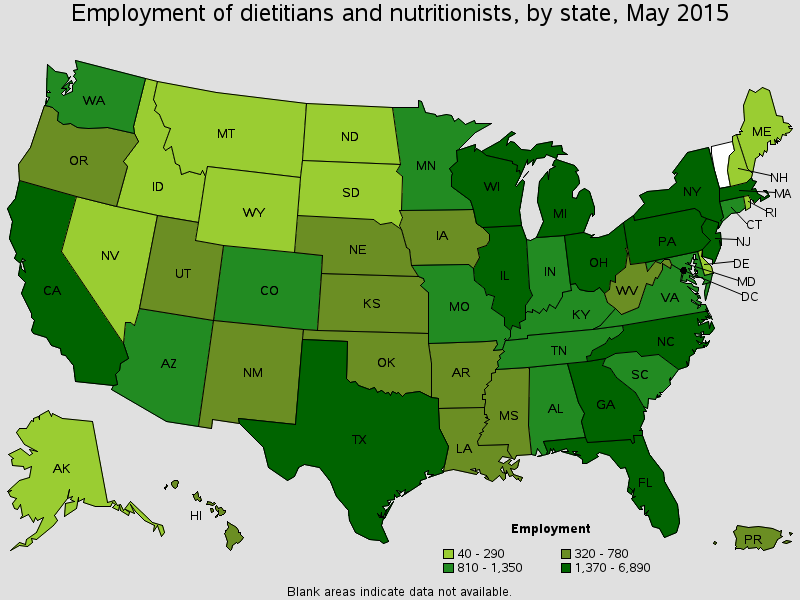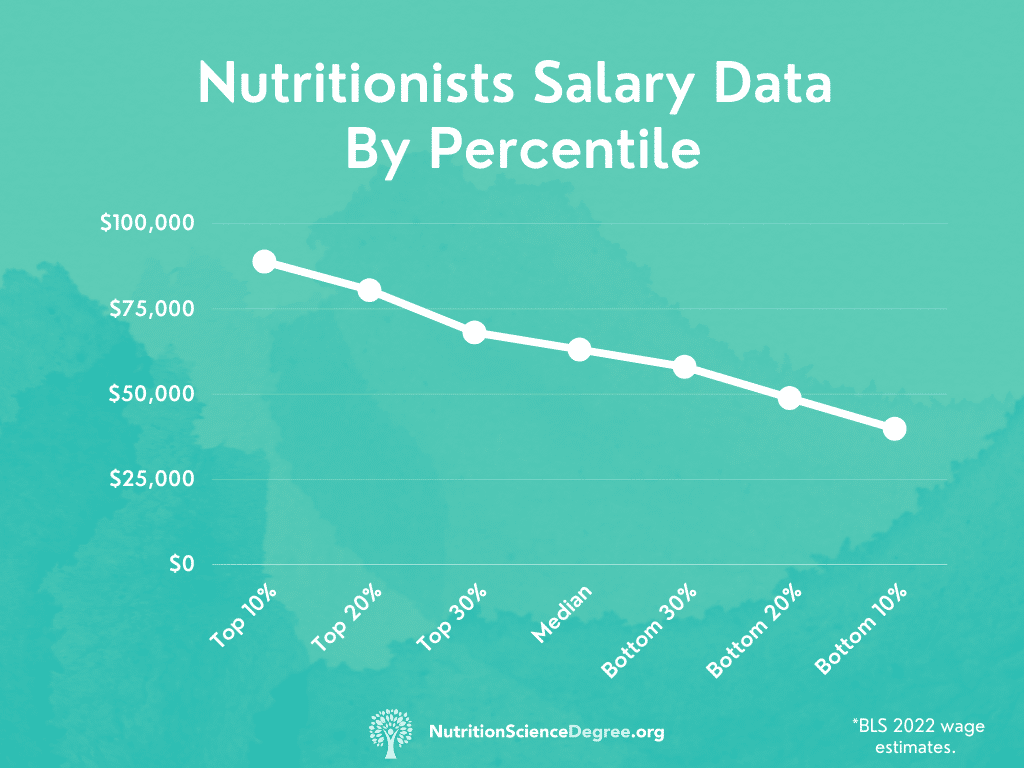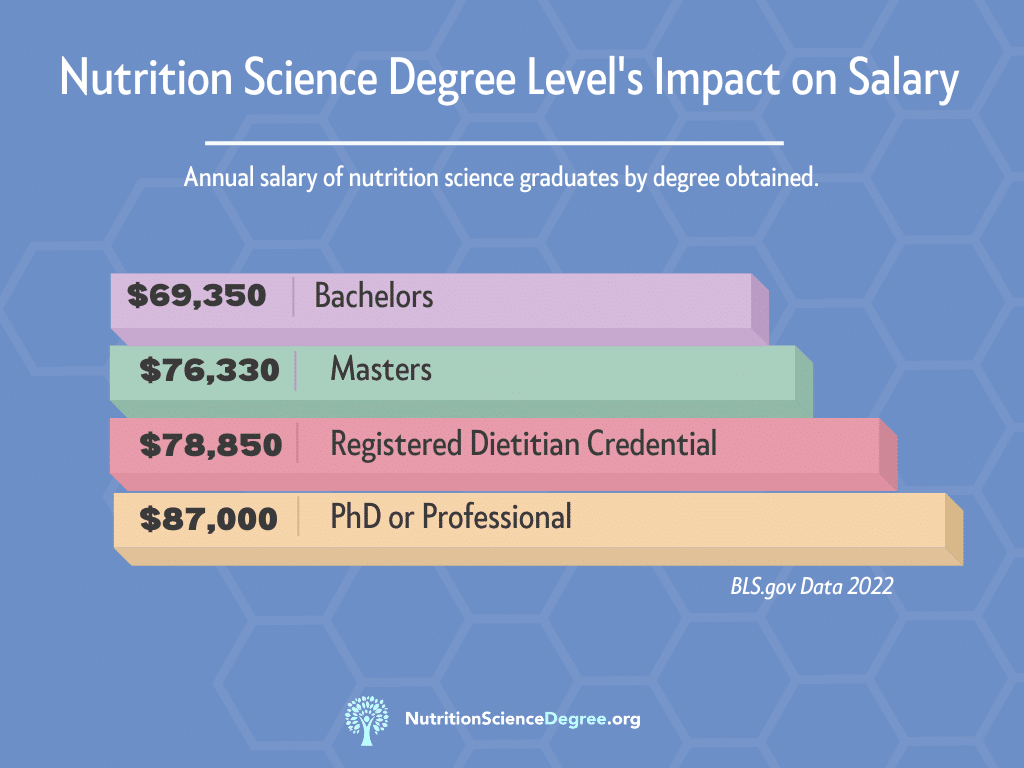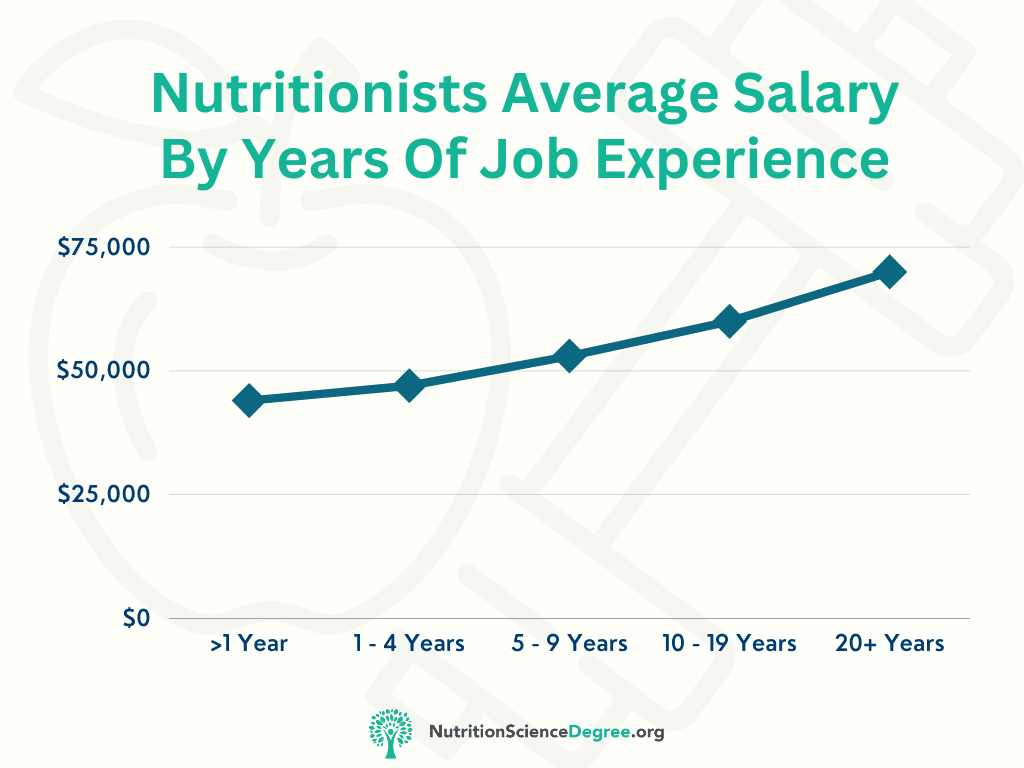
Nutritionist Salary Data
More Answers From Nutritionist Degree Graduates
Nutritionist Salary Facts
Median Salary
$69,350
Hourly Rate
$33.32
Range
$39,840 to $88,880
Job Growth (Proj.)
8% per year
Nutritionist Salary Overview
What is the Average Salary in Nutrition?
Average Salary: The average annual salary for nutritionists is $69,350.
Here is a more detailed breakdown of average salaries by percentile:
- Top 10%: The top 10% of nutritionists in terms of earnings can make an annual salary of over $88,880.
- Top 20%: The top 20% of nutritionists would likely earn above the median salary, possibly in the range of $80,500.
- Top 30%: The top 30% of nutritionists earn approximately $68,090.
- Median: The median salary for nutritionists is approximately $63,090, representing the middle point where 50% earn more and 50% earn less.
- Bottom 30%: The bottom 30% of nutritionists earn an estimated $58,000.
- Bottom 20%: The bottom 20% of nutritionists earn approximately $46,840.
- Bottom 10%: The bottom 10% of nutritionists earn an annual salary of around $39,840 or lower.(BLS May 2022).
In this data, and throughout this page it is important to note that we are using the BLS’s combined salary information for this guide because much of the data pertaining to the salaries are similar. However, there is a difference between nutritionists and dietitians. Regardless, the actual salary a nutritionist earns is based on a variety of factors, including geographic location, level of experience, type of employer, and job responsibilities, each of which we’ll explore below:
Educational Attainment’s Impact On Nutritionist Salary:
Generally speaking, the higher the educational attainment in nutrition science, the higher the salary you will earn. The average salary a nutritionist with a bachelors in nutrition science degree is $69,350, whereas someone with a master’s in nutrition science degree will earn $76,330 on average, an increase of 10%.
- Bachelor’s Degree: Obtaining a Bachelor’s degree in nutrition or a related field is often the minimum requirement for entry-level positions as a nutritionist. With a Bachelor’s degree, nutritionists can expect to earn a median annual salary in the range of $69,350, depending on factors such as experience and location.
- Master’s Degree: Pursuing a Master’s degree in nutrition or a related field can provide advanced knowledge and specialization opportunities, leading to higher-paying positions. Nutritionists with a Master’s degree may earn a median annual salary ranging $76,330
- Registered Dietitian (RD) Credential: Becoming a Registered Dietitian, which requires completing an accredited dietetics program, supervised practice, and passing a national examination, can significantly impact earning potential. RDs often command higher salaries and have more career opportunities. RDs can earn a median annual salary in the range of $78,850.
- Doctorate (Ph.D.) or Professional Degree: Pursuing a doctoral degree, such as a Ph.D. in Nutrition or a related field, or obtaining a professional degree, such as a Doctor of Clinical Nutrition (DCN), can lead to career advancement and higher salaries. Nutritionists with a Ph.D. or professional degree may earn a median annual salary exceeding $87,000, and some may even earn six-figure salaries.
Work Setting’s Impact On Nutrition Science Salaries:
The average salary of a nutritionist can vary depending on whether they work in private practice, as an employee, for the government, or for a nonprofit organization. Here are the median annual salaries for these different types of work settings (BLS 2020):
- Private practice nutritionist: The median annual wage for dietitians and nutritionists (which includes those in private practice) was $63,090 as of May 2020.
- Outpatient Care Center:: The median annual wage for dietitians and nutritionists working in outpatient care centers is $62,870.
- Federal Government: The median annual wage for dietitians and nutritionists working in the federal government was $71,720.
- State Government: Nutritionists and dietitians working for state governments earned a median annual wage of $61,720.
- Nonprofit nutritionist: The median annual salary for a nutritionist working for a nonprofit organization is $49,958 as of April 2022.
Employer Type’s Impact on Nutritionist Salary:
As we mentioned, the industry you work in can play a large role in determining what level salary you can expect to receive. Nutritionists and dietitians can work in a plethora of industries like government, education, research, consultations/private practices, healthcare, corporations, and the list goes on. The following is a list of the on-average, highest paying industries (according the BLS) for nutritionists and dietitians as of 2015:
- Grant-Making and Giving Services – $73,100
- Grocery and Related Product Merchant Wholesalers – $70,920
- Federal Executive Branch – $70,370
- Business, Professional, Labor, Political, and Similar Organizations – $70,060
- Home Health Care Services – $69,240
Work Experience’s Impact On Nutritionist Salaries:
The median annual salary for dietitians and nutritionists, varies based on their years of experience. Here are the median annual wages based on experience level:
- Less than 1 year of experience: $51,110
- 1-4 years of experience: $57,590
- 5-9 years of experience: $67,480
- 10-19 years of experience: $73,540
- 20 or more years of experience: $76,010
How Nutrition Career Choice Impacts Salary:
The average salary that someone with a nutrition science degree earns, is obviously very dependent on which specific career track they follow. Here are the median annual wages for 10 specific careers that someone with a degree in nutrition science might pursue ranked in order from highest to lowest average salary (BLS, May 2020):
- Food Scientist and Technologist: $72,470
- Registered Dietitian Nutritionist (RDN): $63,090
- Clinical Dietitian: $63,090
- Public Health Nutritionist: $65,320
- Nutrition Educator: $56,030
- Food Service Manager: $56,590
- Wellness Coordinator: $51,080
- Health Coach: $50,850
- Culinary Nutritionist: $50,598
- Sports Nutritionist: $50,004
What Is The Employment Outlook For Nutritionists and Dietitians?
The employment outlook for nutritionists and dietitians is generally positive. Dietitians and nutritionist employment is projected to grow 8% from 2019 to 2029, which is much faster than the average for all occupations. This growth is due to an increased emphasis on disease prevention through improved dietary habits, as well as a growing population of older adults who require nutrition therapy to manage chronic conditions.
In addition, as people become more aware of the importance of healthy eating habits, there is a growing demand for nutrition services in a variety of settings, including hospitals, long-term care facilities, schools, and outpatient care centers.
Furthermore, there is a trend towards personalized nutrition and using nutrition as a preventative measure for chronic diseases, which could create more opportunities for nutritionists and dietitians in the future.
Nutritionist and Dietitian Salary Information
Before we begin, There is no specific correlation provided by the BLS between salary and education as it pertains to the field of nutrition science. However the 2015, BLS graph below illustrates that obtaining higher levels of education typically translates into higher weekly earnings and lower unemployment rates for almost all occupations nation-wide.
Using the information that the BLS has provided, nutritionists and dietitians earn about as much as what is reported in the “Bachelor’s degree” line of this bar graph. Therefore if you plan on pursuing education beyond a bachelor’s degree, you may have a greater chance of exceeding the BLS’s reported earnings for this field.
Location’s Impact On Nutritionist Salary:
Due to cost of living and job demand differences, nutrition degree graduates earn, on average, significantly different amounts depending on where they reside. No matter which industry you want to work in as a nutritionist or nutrition scientist, it is always important to do your research and make sure that where you live can support your career goals. Luckily nutritionists and dietitians are needed all over the country, but there are several areas that hire and/or pay more than other states, cities, or towns. For example, you’ll see that the BLS lists California as both the state with the highest employment level and highest pay in the country. Other high-employment level states are illustrated in the darkest shade of green in the map below.
The 5 states with the highest average salary for someone with a nutritionist degree are:
- District of Columbia: $ 83,550
- Maine: $ 82,480
- California: $ 80,160
- New York: $ 79,910
- New Jersey: $ 79,630

| Top Paying Metropolitan Areas for Nutritionists and Dietitians | Top Paying Nonmetropolitan Areas for Nutritionists and Dietitians |
|---|---|
|
|
Source: BLS Occupational Employment Statistics, Dietitians and Nutritionists’ Geographic Profile – 2015
What Our Experts Say About Online Nutrition Degree Programs
I have found just through my career path and journey that moving into more of a freelance independent contract I can charge significantly higher rates working with private practice entities than I could working for a hospital or a nursing home.

Nutrition allows you to work for a hospital or in the community or work for the government or school or for yourself, and that really kind of expands the salary range for it. Today, you’re probably looking at $50,000 to $90,000 for most clinical types of jobs, maybe food service jobs. That goes up with more experience, if you have a master’s degree, if you have your RDN all impact nutrition salary.

Nutrition science salary really varies depending on where you’re working in the country. If you’re in a rural area that maybe doesn’t have many hospitals or many food production plants … you’re not really going to get near that higher end of compensation. If you’re working in an area that has a lot of medical centers, and that has a lot of safe food production plants you can definitely earn more in the $90,000 to $120,000 area.








